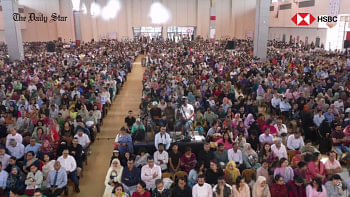Blood of 41 freedom fighters covered the grassy plain of Jhenidah village
JHENIDAH, Jan 17: It was midnight following October 13 and all were in deep slumber as usual. The moonless night shadowed the whole nature within its deep black curtain but a high-powered search light suddenly broke the silence of Kumiradaha village.
The barbaric Pakistani soldiers laid siege to a base of freedom fighters there and opened fire upon it in a frenzy. As the sun of October 14 peeped up the eastern horizon spraying soft crimson rays all over, the frightened villagers counted bullet-riddled bodies of 41 valiant sons of the soil lying around their camp.
They could neither utter a word nor could they weep at the sight of the bodies of the young boys and their already clotted blood that covered a wide grassy plain around their camp. None but only the night silently witnessed how ruthlessly the Pakistani devils gunned down these brave sons.
Kumiradaha under Shailakupa thana of the district is a village blessed with nature's bounty and the nearby Kumar river holds into its bosom the day-to-day life and living of the poor villagers for centuries together. On that horrific night during the War of Liberation, the river seemed to have been a mute witness of the history's worst ever genocide in the village, only 14 miles away from the district town.
Freedom fighter Akter Hossain, a survivor of that cowardice genocide, was weeping like a tiny tot while describing the devilish act of Pakistani Army. "The blood-hungry monsters attacked us in a planned way as they earlier learnt about our stronghold that champed around 150 freedom fighters of entire Shailkupa thana," he said.
All of them were just dumbfounded when they saw hundreds of bullets were being sprayed upon them from the sophisticated weapons from all directions. "We could not immediately sense what to do but soon we decided to fire back risking our lives," he said.
The freedom fighters were in fact quite helpless in the face of the sudden attack of a heavy armoured troupe of Pakistani Army at midnight but they fought bravely till the next morning. A lieutenant of the enemy was also killed in that battle.
They were earlier tipped off about the enemies' possible march to this village from Khamarpara under Shreepur thana of neighbouring Magura district where the hyenas were killing innocent Banglaees and burning down their dwelling houses. "We saw people fleeing from Shreepur thana to Shailakupa thana and then we were waiting for the blood-sucker demons to proceed to us," Akter Hossain recalled.
In the meantime, the freedom fighters in Kumiradaha camp were taking all preparations by digging bunkers and amassing their weapons whatever they had at that time to swoop upon the Pakistani Army. Airman Majibar Rahman, who fled the Pakistan Airforce to join the War of Liberation, brought around 100 freedom fighters together, divided them into three groups and then posted each troupe in three different ambush to check the enemies.
The three troupes led by Shaheed, Monwar Hossain and Golam Royees ambushed near WAPDA house, Canal bridge and the Kumar river while others were guarding the whole area. "We could not smell out the fact that the enemies will attack us suddenly at midnight," he said adding that the freedom fighters without wasting a single moment opened return fire but by then 41 brave sons already embraced martyrdom. A memorial plaque of 13 freedom fighters of the total 41 still bears the horrors of 1971 while the memorial stone of 5 others is no more seen today. The bodies of these 13 brave sons were buried behind the nearby Abaipur Union Council office while five others were buried behind the wall of Abaipur Water Development Board office.
The names of 13 freedom fighters are inscribed on the memorial plaque. They are Nazrul Islam, Abul Hussain, Abu Jafar, Abul Kashem, Ukiluddin, Alimuddin, Younus Ali, Chetan Ali, Shahadat Hussain, Abu Sufian, Ismail Hussain, Yaaruddin and Kamaluddin of different villages under Shailakupa thana. The residents of Kumiradaha have long been demanding preservation of these two mass graves to keep alive the memory of the War of Liberation. So far, however, there has been no initiative to do it.
Today's generations heard from their elders about the heroic sacrifices of these valiant freedom fighters for achieving the country's long-cherished independence.

 For all latest news, follow The Daily Star's Google News channel.
For all latest news, follow The Daily Star's Google News channel. 



Comments